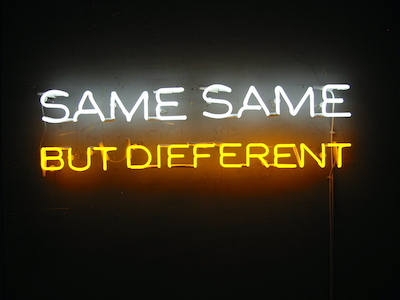Watch Out
The word than typically follows a comparative adjective, such as closer or more bizarre. You would thus say:
K Street is closer than M Street.
Or you would say:
This movie was more bizarre than any movie she had ever seen.
The word than suggests some sort of comparison. Hence, we use the comparative adjective plus the word than. The expression is usually followed by a noun, pronoun, or other noun form.
The word different is an adjective, but it is not a comparative adjective. As a result, among some stylists you’ll find a distinct preference for the expression different from. You would thus say:
These shirts are different from the ones I bought last year.
Or you would say:
His car is different from mine.

In the above examples, the expression is followed by a noun (ones) or pronoun (mine) form.
You’ll need to use different than, however, when you want to follow the expression not with a noun but with a clause. The word than then serves as a conjunction that gets the clause going. Thus, you would say:
This experience was different than he thought it would be.
Or you would say:
My birthday this year was different than it was last year.
In the latter example, if you used different from, you would have to provide a noun or pronoun to serve as the object of from:
My birthday this year was different from what it was last year.
So a big distinction between the two expressions is this: different from typically requires a noun or noun form to complete the expression, while different than may be followed by a clause.
New Fowler says that both different from and different than have flourished in America. New Fowler, p. 212. I once thought that most professional writers would use the preferred different from. But on July 30, 2001, the following appeared on Slate.com:
Washington, D.C., is different than Hollywood, or Manhattan, or any other city in which young girls attach themselves to older, successful men. Dahlia Lithwick, “G-Girl Confidential,” July 30, 2001, Slate.com.
New Fowler notes that writers prefer different from in Britain. Garner Oxford urges the use of different from in America, because than implies a comparison and different is not a comparative adjective. Garner Oxford, p. 101.
But in Britain, as in America, we do find the two expressions different from and different than used interchangeably, though stylists favor different from. The OED traces the use of different from to 1590 and different than to 1644. New Fowler, p. 212. The British also use a structure sounding strange to American ears: different to. Consider this example:
I found that a meadow seen against the light was an entirely different tone of green to the same meadow facing the light. New Fowler, p. 212.
Though it sounds strange, the structure different to is (how shall I say this?) similar to the structure similar to. If something can be similar to something else, why can’t it be different to something else? We’ll have to ask Igor, Amber, and Miss Hamrick.
So here’s the best advice:
Ordinarily, favor different from over different than. Use different than when you want a clause to follow the expression. Be consistent within the paper.
Previous: Fewer vs. Less
Next: Compound Adjectives








Have a discussion about this article with the community:
Report Comment
We're doing our best to make sure our content is useful, accurate and safe.
If by any chance you spot an inappropriate comment while navigating through our website please use this form to let us know, and we'll take care of it shortly.
Attachment
You need to be logged in to favorite.
Log In